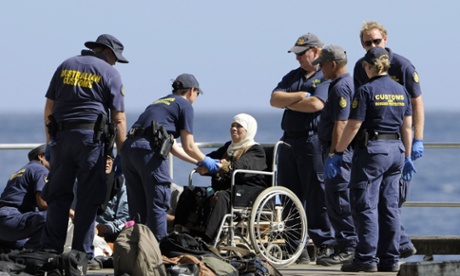As a GP who worked on Nauru and Christmas Island, I’ve seen men with their lips sewn closed, women drinking from bottles of shampoo and children with weeping sores

I am often asked questions about my work as a general practitioner in the Christmas Island and Nauru immigration detention centres. Are the conditions as bad as they say? Is the health care adequate? Are they genuine refugees? What are the people like? I often don’t know what to say, and wonder whether my answers are ever sufficient. Words often seem inadequate to describe what I saw, or the ways in which my experience continues to impact upon me.
Are the conditions bad? Absolutely. Imagine tents at a grungy music festival, but without the festivity and enclosed by wire. Imagine a world that has a 500m radius and is characterized by bleakness and oppressive humidity. And then imagine living there, for months on end, with no purpose or direction, unable to leave and not being told if you ever will.
Is the health care adequate? Definitely not. But arguably this is impossible to provide in such remote and underdeveloped centres, where the primary purpose is not health but segregation and isolation.
Are they genuine refugees? I have no idea because I never asked, and as a doctor who sat beside Ahmed, or Leila, or Antony I didn’t really need to know.
So what are “they” like? And what is it like to be their doctor? As a practitioner working in a detention centre you see many shocking departures from the ordinary – men with their lips sewn closed with thread from a blanket, women drinking bottles of shampoo, children with weeping sores and no shoes, people hurting themselves to express their pain. In each case you try and do what you can to treat both the physical consequences of living in harsh environments and the mental anguish caused by losing hope.
But what is also striking, and what haunts me still, is that each person I met whom my country detained was someone I recognised. Each of them had a very ordinary life until something extraordinary led them to leave their homes. They are people with very ordinary aspirations: to be safe, to keep their family safe, to have a future, to be healthy and to live in a country where all that might be possible.
I remember the old Somali woman who yelled at me for running late with my appointments, but who later sheepishly gave me a woven friendship bracelet. I remember the Iraqi father, intent on maintaining normality for his children, who simulated a classroom by day and assigned homework at night. I remember the tiny Tamil couple whose child drowned at sea who would pull my chair in front of a fan and offer me Tim Tams when I visited. I remember the Sudanese woman who looked at me with a conspiratorial wink when the one obstetrician asked her, for the sixth time, where she delivered her children. “Is this guy for real?” she implied as she answered “on the kitchen floor” – for the sixth time. I remember all those times I walked into the waiting room and, in a vain attempt to be respectful, clumsily said the patient’s name,only to have 10 people yell back “what boat number”?
At the same time, I also remember other ordinary people trying desperately to deliver adequate health care. I particularly cherish the experience of working with the skilled interpreters there, many of whom were refugees themselves. Their professionalism, care and quiet dignity as they gently corrected my cultural faux pas filtered the colourful words of angry patients and scrambled to avoid having to translate yet another discussion of menstruation. But most of all, I was grateful for their willingness to translate harrowing stories of trauma, loss, survival and escape – stories that often echoed their own journeys.
It is too easy to get caught up in the endless political debate about Australia’s approach to asylum seekers and forget that what lies at its core are people who deserve consideration, care and respect. I could write endlessly about the heroism I’ve witnessed and feats of individual triumph, or about the shocking and traumatic events I witnessed. However, what is most troubling is that we are intentionally harming ordinary people – taking away their freedoms, rights and dreams.
While we may stigmatise them and separate them from us, ultimately asylum seekers want the same things as any of my patients living in Adelaide.
